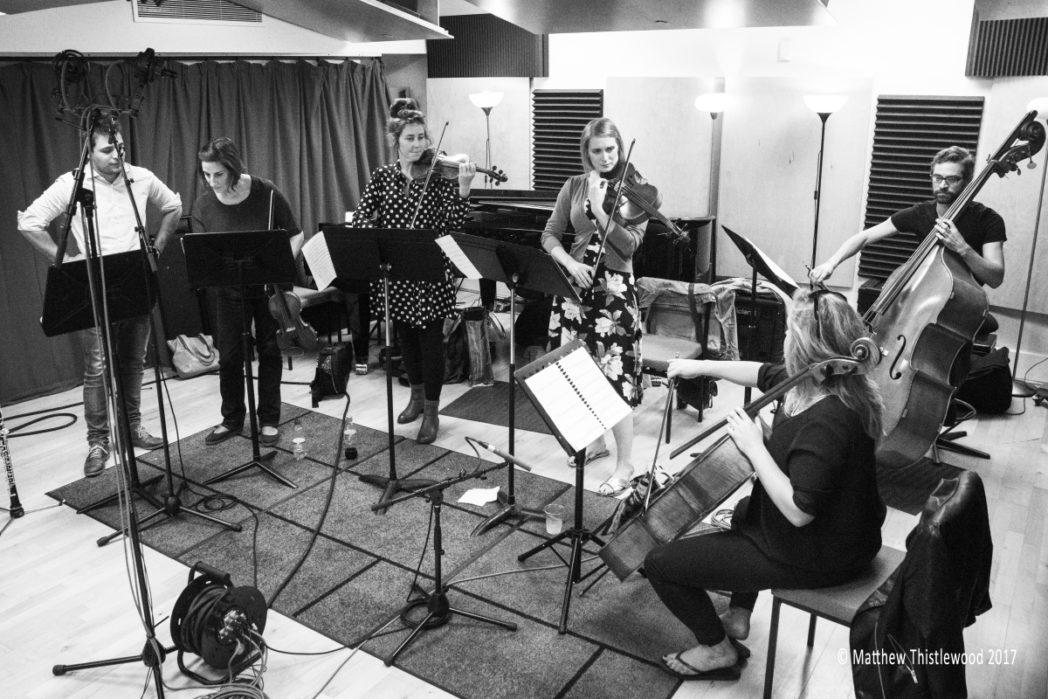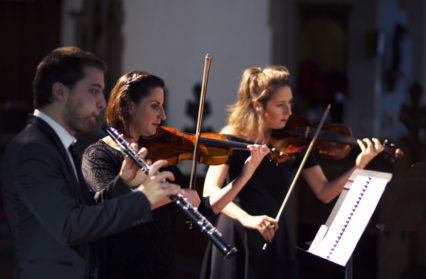Cath Barton reviews Sound Affairs: Radio Amore, the touring production from eclectic Welsh composer Charlie Barber, which captures the essence of a late-night radio show.
Sound Affairs: Radio Amore
Mavron String Quartet
Michele Batani, oboe
Ashley-John Long, double bass
The Chapel, Abergavenny, 11 October, 2018
Eclectic Welsh composer Charlie Barber’s work is often on the intersection of the audio and the visual, but in Radio Amore, this touring production for Sound Affairs his focus as Artistic Director is entirely on the music, the notion being to simulate a late-night radio show in a live music mix-tape. The music is a mix of the British and Italian baroque and what the programme notes describe as ‘contemporary classics’.
The idea is an attractive one, with the segueing from piece to piece being sometimes facilitated by Barber’s (composed) Tuning to Radio Station interludes for strings, and overall by a harmonic structure which leads seamlessly and elegantly through the circle of fifths.
The sequence starts with Barber’s Electric Mains Hum before the musicians come on stage, and this – with its iconic snippet of the BBC radio shipping forecast included – does effectively set the mood for the central conceit of Radio Amore. The solemnity of Purcell’s ‘Grand Dance’ from King Arthur and the serenity of Pergolesi’s Stabat mater dolorosa are followed – after an interval from Tuning – by Barber’s Piazza Novona, evoking the bubbling fountains of Rome and moving towards the tonality and outburst of Michael Nyman’s An Eye for Optical Theory from his music for Peter Greenaway’s 1982 film The Draughtsman’s Contract.

Nyman’s music was written for larger forces, but in this chamber setting the five string players and oboist were able to reveal the details within this syncopated reconstruction of a baroque figure which the bombast of saxophones and horns against massed strings, piano and bass can obscure. There is lots of dance in baroque music, but it is generally contained – Nyman’s music reveals its joy, and makes players and listeners alike smile with delight.
Barber’s Radio Message for Orpheus references Cocteau’s film in which Orpheus receives messages from the underworld – or the BBC in wartime – through his car radio. It’s a neat allusion, and the rhythmic change into Albinoni’s Oboe Concerto in B flat seamless.
Thus far the sequence – call it concert or radio programme – satisfied. At the full hour’s uninterrupted length it palled a little. After music by Corelli, Vivaldi and Matthew Locke, another piece of nouveau-baroque by Michael Nyman – Chasing Sheep is Best Left to Shepherds – gave a welcome change of pace, and Barbara Strozzi’s restrained Hor che Apollo immediately after that was all the more luminous for the contrast. But as the concert continued I felt the drive of the music was too relentless, the contrasts lessened and the programme cried out for some breathing space. That said, the throbbing transcription of the aria ‘Vedro con mio diletto’ from Vivaldi’s little-known opera Giustino was a marvel. I also have to admire Charlie Barber’s baroque pastiches, but I would have welcomed the inclusion of something by another contemporary composer as well, a bit of spice in the mix.
As the lights dimmed and the musicians played Barber’s Epilogue: Love Is, the mood became more reflective, drawing this sometimes tempestuous journey to a quiet and gentle close.
The musicians were all superb, and visibly sympathetic to one another. Those Nyman pieces, in particular, must be mighty difficult to sustain when there are only six of you, but the players showed no sign of strain. I loved the sounds of the combination of oboe and strings. The Mavron Quartet are well known and loved and Ashley-John Long, an alumnus of the Royal Welsh College of Music and Drama, no stranger to South Walian audiences. Italian oboist Michele Batani was a new voice to me and one I look forward to hearing again.
The Chapel in Abergavenny provides a fine acoustic for chamber music, and it was good to see it drawing a capacity audience of locals and those from further afield.
Header photo by Donna Newberry
You might also like…
Marine Furet reviews National Theatre Wales’s Constellation Street, part of their Network programme of digital work that was launched in response to the COVID-19 lockdown, and finds a play that is successful in mixing gritty social realism and tragedy through four dramatic monologues.
Cath Barton is an English writer who lives in Wales. Her prize-winning debut novella The Plankton Collector is published by New Welsh Review. Cath is on the 2018 Literature Wales Mentoring programme, working on a collection of short stories inspired by the work of Hieronymus Bosch. https://cathbarton.com @CathBarton1



 Enjoyed this article? Support our writers directly by buying them a coffee and clicking this link.
Enjoyed this article? Support our writers directly by buying them a coffee and clicking this link.







